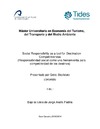Identificador persistente para citar o vincular este elemento:
https://accedacris.ulpgc.es/jspui/handle/10553/12182
| Campo DC | Valor | idioma |
|---|---|---|
| dc.contributor.advisor | Araña Padilla, Jorge | - |
| dc.contributor.author | Skalisiute, Greta | - |
| dc.date.accessioned | 2014-09-17T02:30:14Z | - |
| dc.date.accessioned | 2018-05-15T10:55:07Z | - |
| dc.date.available | 2014-09-17T02:30:14Z | - |
| dc.date.available | 2018-05-15T10:55:07Z | - |
| dc.date.issued | 2014 | en_US |
| dc.identifier.uri | https://accedacris.ulpgc.es/handle/10553/12182 | - |
| dc.description.abstract | Tourism activity is increasingly growing worldwide. However, the number of tourist destinations is also growing at a fast pace, which is turning the tourist market in a highly competitive environment. In this study we propose the use of Social Responsibility (SR) policies as a tool for tourist destinations to gain competitiveness advantages. Data comes from a Discrete Choice Experiment (DCE), in which we measured visitors' of Cartagena de Indias (Colombia) willingness to pay (WTP) for different SR actions. In particular the policies were: (i) Labour conditions, (ii) Environmental issues, (iii) Community relations; (iv) Animal welfare. Althoug there was some clear differences among nationalities (e.g. "cultural bias") the results show on average that tourist had a positive attitude to SR policies. In terms of importance, the dimensions were ranked as follows: (1) Environment; (2) Labour; (3) Social Projects. While all SR activities were discovered to have a possitive influence on tourists choices, ther still exist a large controversy estimating the real impact of SR policies on tourism demand. Therefore, the paper concludes with some ideas for further investigation. | - |
| dc.format | application/pdf | es |
| dc.language | eng | en_US |
| dc.rights | by-nc-nd | es |
| dc.subject | 531290 Economía sectorial: turismo | es |
| dc.subject.other | Tourism | es |
| dc.subject.other | Social responsability (SR) | es |
| dc.subject.other | Destination competitiveness | es |
| dc.subject.other | Discrete choice experiment (DCE) | es |
| dc.title | Social responsibility as a tool for destination competitiveness | en_US |
| dc.title.alternative | Responsabilidad social como una herramienta para competitividad de los destinos | en_US |
| dc.type | info:eu-repo/semantics/masterThesis | en_US |
| dc.type | MasterThesis | en_US |
| dc.compliance.driver | 1 | es |
| dc.contributor.centro | IU de Turismo y Desarrollo Económico Sostenible | en_US |
| dc.contributor.facultad | Facultad de Economía, Empresa y Turismo | en_US |
| dc.identifier.absysnet | 701593 | es |
| dc.identifier.crisid | - | - |
| dc.investigacion | Ciencias Sociales y Jurídicas | es |
| dc.rights.accessrights | info:eu-repo/semantics/openAccess | es |
| dc.type2 | Trabajo final de máster | en_US |
| dc.identifier.matricula | TFT-32225 | es |
| dc.identifier.ulpgc | Sí | es |
| dc.contributor.titulacion | Máster Universitario en Economía del Turismo, del Transporte y del Medio Ambiente | es |
| item.fulltext | Con texto completo | - |
| item.grantfulltext | open | - |
| crisitem.advisor.dept | Departamento de Análisis Económico Aplicado | - |
| Colección: | Trabajo final de máster | |
Visitas
64
actualizado el 10-ene-2026
Descargas
33
actualizado el 10-ene-2026
Google ScholarTM
Verifica
Comparte
Exporta metadatos
Los elementos en ULPGC accedaCRIS están protegidos por derechos de autor con todos los derechos reservados, a menos que se indique lo contrario.
